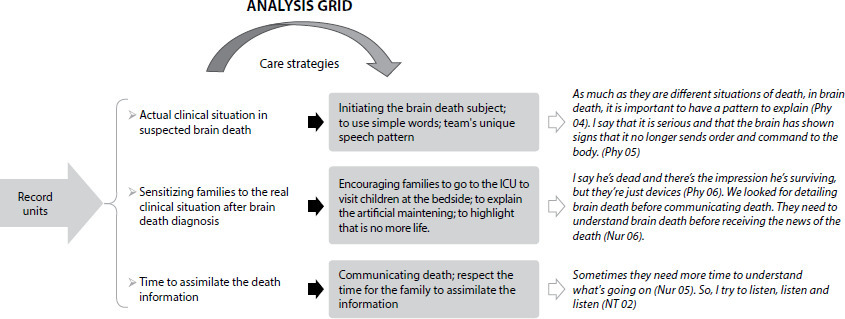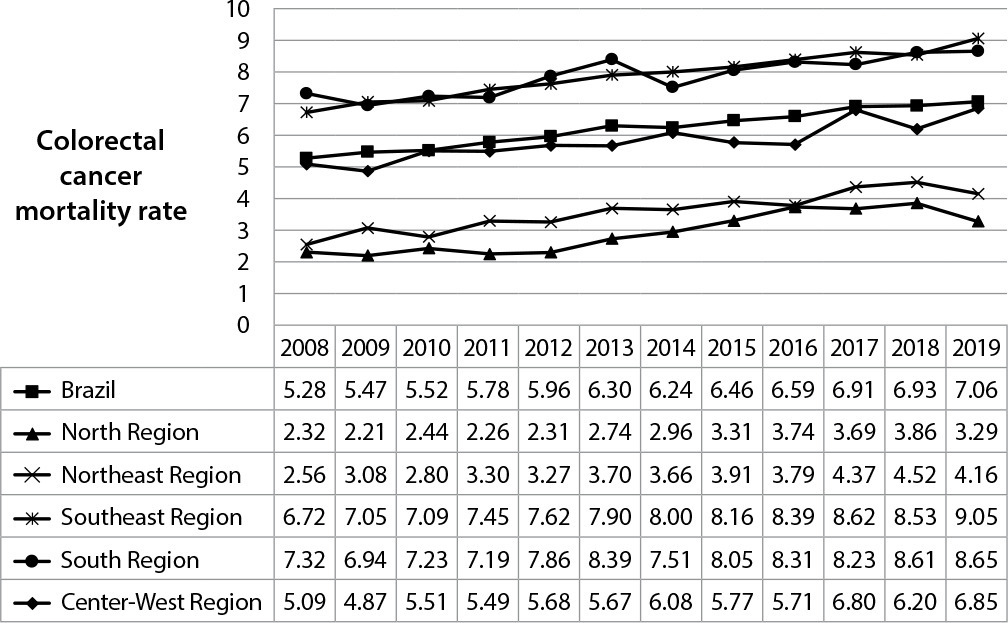-
ORIGINAL ARTICLE09-23-2022
Social entrepreneurship in the professional training in Nursing
Revista Brasileira de Enfermagem. 2022;75(3):e20220391
Abstract
ORIGINAL ARTICLESocial entrepreneurship in the professional training in Nursing
Revista Brasileira de Enfermagem. 2022;75(3):e20220391
DOI 10.1590/0034-7167-2021-0391
Views0See moreABSTRACT
Objectives:
to assess the knowledge and practices that stimulate social entrepreneurship in the professional training of Nursing students.
Methods:
qualitative exploratory-descriptive study carried out with 44 Nursing students from a University in the South Region of Brazil. Data were collected between May and August 2021, through individual online interviews. The participants were students of nursing course in the 6th semester or above, who had previously participated in teaching, research, or university outreach activities on entrepreneurship.
Results:
the data was organized and analyzed according to the thematic analysis technique and resulted in three thematic categories: Meanings of social entrepreneurship, Factors that sparked social entrepreneurship, and Recognizing oneself as an entrepreneurial nurse.
Final Considerations:
the knowledge and practices that stimulate social entrepreneurship in the professional training of Nursing students are associated with teaching, research and university outreach activities that allow concrete experiences in the living and dynamic world of communities.
-
ORIGINAL ARTICLE09-23-2022
Almanac for preventing the use of alcohol and other drugs among adolescents: construction and validity
Revista Brasileira de Enfermagem. 2022;75(3):e20220118
Abstract
ORIGINAL ARTICLEAlmanac for preventing the use of alcohol and other drugs among adolescents: construction and validity
Revista Brasileira de Enfermagem. 2022;75(3):e20220118
DOI 10.1590/0034-7167-2022-0118
Views0See moreABSTRACT
Objectives:
to build and validate an almanac to prevent the use of alcohol and other drugs among adolescents.
Methods:
a methodological study, based on the adaptation of Echer’s stages and on Culture Circles. The Content Validity Index and the Concordance Index were used for validity.
Results:
problematization in Culture Circles and literature review supported the elaboration of an almanac. In validity with eleven health judges, the material obtained a global Content Validity Index of 0.73 in the first version and 0.84 in the second version, with validation with five judges. In terms of concordance, the 95% value was obtained with four technical judges and 86.2% with nine participants from the target audience.
Conclusions:
the constructed and validated almanac has playful, dialogic and problematizing potential.

-
ORIGINAL ARTICLE09-23-2022
Brain death communication with parents of children and adolescents: care strategies
Revista Brasileira de Enfermagem. 2022;75(3):e20210943
Abstract
ORIGINAL ARTICLEBrain death communication with parents of children and adolescents: care strategies
Revista Brasileira de Enfermagem. 2022;75(3):e20210943
DOI 10.1590/0034-7167-2021-0943
Views0See moreABSTRACT
Objectives:
to identify care strategies developed by professionals from critically ill patients’ units in communicating BD with parents of children and adolescents.
Methods:
an exploratory and descriptive research with a qualitative approach, carried out in two health institutions between October and December 2019, through semi-structured interviews. Data analysis took place through content analysis.
Results:
twenty-one professionals participated. Three care strategies were identified: actual clinical situation in suspected brain death; sensitizing families to the real clinical situation after brain death diagnosis; and time to assimilate the death information.
Final Considerations:
the care strategies for communicating brain death to families identified in this study present the possibility of subsidizing health managers in training and support promotion for professionals in care practice. Moreover, they can be incorporated and validated in the care practice of the studied context.

-
ORIGINAL ARTICLE09-23-2022
Effects of multidisciplinary rounds and checklist in an Intensive Care Unit: a mixed methods study
Revista Brasileira de Enfermagem. 2022;75(3):e20210934
Abstract
ORIGINAL ARTICLEEffects of multidisciplinary rounds and checklist in an Intensive Care Unit: a mixed methods study
Revista Brasileira de Enfermagem. 2022;75(3):e20210934
DOI 10.1590/0034-7167-2021-0934
Views0See moreABSTRACT
Objectives:
to analyze the implementation of multidisciplinary checklist-directed rounds before health indicators and multidisciplinary team perception of an Intensive Care Unit.
Methods:
a mixed methods study, with an explanatory sequential design, carried out at a hospital in southern Brazil, from September 2020 to August 2021. The integration of quantitative and qualitative data was combined by connection.
Results:
after the implementation of checklist-directed rounds, there was a significant reduction in hospital stay from ventilator-associated pneumonia, urinary tract infection and daily invasive device use. The investigated practice is essential for comprehensive care, harm reduction, effective work and critical patient safety.
Conclusions:
the multidisciplinary rounds with checklist use reduced data on health indicators of critically ill patients and was considered a vital practice in the intensive care setting.
-
REFLECTION09-23-2022
Legislation and quality of nursing education in the context of the COVID-19 pandemic
Revista Brasileira de Enfermagem. 2022;75(3):e20210825
Abstract
REFLECTIONLegislation and quality of nursing education in the context of the COVID-19 pandemic
Revista Brasileira de Enfermagem. 2022;75(3):e20210825
DOI 10.1590/0034-7167-2021-0825
Views0See moreABSTRACT
Objectives:
to reflect on the governmental normative acts issued for higher education during the COVID-19 pandemic and on the repercussions of these acts on the quality of nursing education in Brazil.
Methods:
this is a reflection on the repercussions for the quality of nursing education, based on the normative acts applied to higher education, enacted from March to December 2020, available on the Ministry of Education website and in the current literature on the subject anchored in the National Curriculum Guidelines for the Undergraduate Nursing Course.
Results:
educational legislation, in the context of the pandemic, distanced education from the world of work, as well as from the quality of training established in the guidelines.
Final Considerations:
remote teaching in nursing makes it difficult to train professionals with the capacity to effectively teach and learn in the real world of care and health promotion in the Unified Health System.
-
09-19-2022
Subjetivação dos profissionais de saúde no fim da vida e morte no serviço domiciliar
Revista Brasileira de Enfermagem. 2022;75(2):e20210684
Abstract
Subjetivação dos profissionais de saúde no fim da vida e morte no serviço domiciliar
Revista Brasileira de Enfermagem. 2022;75(2):e20210684
DOI 10.1590/0034-7167-2021-0684
Views0See moreRESUMEN
Objetivos:
analizar los modos de subjetivación de los profesionales de la salud hacia el final de la vida y la muerte en un servicio de atención domiciliaria.
Métodos:
investigación cualitativa realizada en un servicio de atención domiciliaria en un hospital escuela en el sur de Brasil, con 12 profesionales de la salud. Para la recolección de datos se utilizó la observación participante y entrevistas semiestructuradas, de abril a septiembre de 2018. Los datos fueron analizados a partir del concepto de poder y subjetivación de Foucault.
Resultados:
los profesionales son sensibilizados por discursos morales, espirituales y de cuidados paliativos, así como por vivencias que los constituyen sujetos que modifican sus modos de vida y ejercicio profesional a partir de la relación con la muerte.
Consideraciones Finales:
la red discursiva de los cuidados paliativos es interiorizada por los profesionales, que realizan sus prácticas con conductas encaminadas a promover “una buena muerte”.
-
ORIGINAL ARTICLE09-19-2022
Colorectal cancer mortality in women: trend analysis in Brazil and its regions and states
Revista Brasileira de Enfermagem. 2022;75(2):e20210751
Abstract
ORIGINAL ARTICLEColorectal cancer mortality in women: trend analysis in Brazil and its regions and states
Revista Brasileira de Enfermagem. 2022;75(2):e20210751
DOI 10.1590/0034-7167-2021-0751
Views0See moreABSTRACT
Objectives:
to analyze colorectal cancer mortality trends in women in Brazil and its regions and states.
Methods:
ecological, time-series study with trend analysis of deaths caused by colorectal cancer in women in Brazil and its regions and states between 2008 and 2019. Polynomial regression was used to treat the data.
Results:
48,225 deaths of women caused by colorectal cancer were examined. There was an increasing mortality trend in Brazilian women, with regional differences that resulted from socioeconomic, political, and cultural inequalities. The South Region stood out with the highest rate (7.32) in 2008, which increased to 8.65 in 2019, followed by the Southeast Region, whose rates were 6.72 and 9.05 in 2008 and 2019, respectively.
Conclusions:
colorectal cancer mortality increased, which indicates the need to expand public policies oriented toward screening and early diagnosis of colorectal cancer in women.

-
ORIGINAL ARTICLE09-19-2022
Health professionals’ subjectivation towards end of life and death in home care service
Revista Brasileira de Enfermagem. 2022;75(2):e20210684
Abstract
ORIGINAL ARTICLEHealth professionals’ subjectivation towards end of life and death in home care service
Revista Brasileira de Enfermagem. 2022;75(2):e20210684
DOI 10.1590/0034-7167-2021-0684
Views0See moreABSTRACT
Objectives:
to analyze the modes of subjectification of health professionals towards end of life and death in a home care service.
Methods:
this is qualitative research carried out in a home care service at a teaching hospital in southern Brazil, with 12 health professionals. Participant observation and semi-structured interviews were used for data collection, from April to September 2018. Data were analyzed based on Foucault’s concept of power and subjectivation.
Results:
professionals are sensitized by moral, spiritual and palliative care discourses, as well as experiences that constitute them subjects who modify their ways of life and professional practice based on the relation with death.
Final Considerations:
the discursive network of palliative care is internalized by professionals, who carry out their practices with behaviors aimed at promoting “a good death”.
Search
Search in:
Nuvem de Tags
Adolescente (85) Atenção Primária à Saúde (239) COVID-19 (91) Criança (91) Cuidados de Enfermagem (269) Educação em Enfermagem (151) Educação em Saúde (139) Enfermagem (930) Enfermagem Pediátrica (86) Estudantes de Enfermagem (77) Estudos de Validação (131) Família (87) Idoso (208) Promoção da Saúde (99) Qualidade de Vida (104) Saúde do Trabalhador (86) Saúde Mental (145) Saúde Pública (82) Segurança do Paciente (150) Tecnologia Educacional (100)



